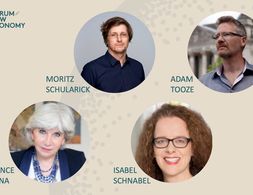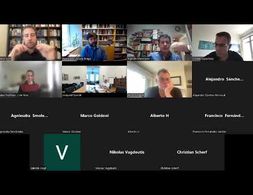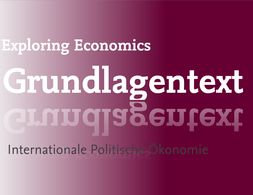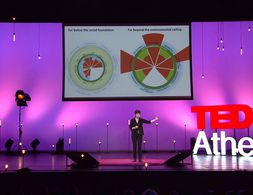365 Ergebnisse
Nach dem vorherrschenden Verständnis ist Geld vor allem eine sehr individualistische Sache. Doch wenn wir es als öffentliche Infrastruktur verstehen, bekommen wir auch ein anderes Bild von uns Menschen und unserem Zusammenleben. Ein Beitrag von Jakob Feinig.
Central banking is anything but clear-cut. As this webinar with Benjamin Braun demonstrates, the standard view of central banks as independent public entities that govern financial markets and "print" money is at least partially misleading.
Exploring Economics, an open-access e-learning platform, giving you the opportunity to discover & study a variety of economic theories, topics, and methods.
There was a time when the world still seemed a good and above all simple place for monetary authorities Every few weeks they had to decide whether in view of the latest price developments it would be better to raise the key interest rates by a quarter point or not …
This is the second part of the seminar A Hard Currency of Politics The discussion centers on the The Currency of Politics by Stefan Eich and is hosted by the journal European Law Open Stefan Eich s presentation of his argument starts at minute 7 53 The discussion centers on …
This self-paced free course by Perry Merhling guides you to his "Money View" approach that integrates the fields of economics and finance. The course can easily be understood by people interested people without technical economic knowledge or training as it is primarily a tool for analysis.
This brief but comprehensive account of the Post Keynesian approach to economic theory and policy is ideal for advanced undergraduate and postgraduate students in economics, public policy and other social sciences. Clear, non-technical and with a strong policy focus, it will also appeal to all of those who are dissatisfied with mainstream economics and wish to explore the alternatives.
Jo Michell discusses some key implications of climate change regarding the standard policy prescriptions of Post-Keynesian economics, particularly relating to the possible necessity of consumption constraints and the presence of recurrent inflation.
Hohepriester der Freihandelssekte Internationaler Handel und Globalisierung in Standardlehrbüchern der Volkswirtschaftslehre Achim Truger Quelle van Treeck Till and Janina Urban Wirtschaft neu denken Blinde Flecken in der Lehrbuchökonomie iRights Media 2016 Das Buch kann hier bestellt werden http irights media de publikationen wirtschaft neu denken Rezensierte Bücher Krugman P R …
Der große Zwiespalt zwischen Effizienz und Gerechtigkeit Realität oder Ideologie Till van Treeck Quelle van Treeck Till and Janina Urban Wirtschaft neu denken Blinde Flecken in der Lehrbuchökonomie iRights Media 2016 Das Buch kann hier bestellt werden http irights media de publikationen wirtschaft neu denken Rezensierte Bücher Mankiw N G …
This chapter discusses the role of gender in economic relations, processes, and outcomes. Gender differences in economic outcomes such as labor force participation and wages have received growing attention from economists in the last several decades – a positive and much needed development in economic thinking.
This article reviews insights of existing literature on global care chains. A specific focus is laid on the impact that the refugee crisis has on global care chains and in turn how the crisis impacts the de-skilling of the women in the migrant workforce.
Die Darstellung von Unternehmen in Varians Lehrbuch „Grundzüge der Mikroökonomik“
Diese Webseite widmet sich der Vielfalt bestehender ökonomischer Theorien und Methoden. Orientiere Dich, vergleiche, entdecke und studiere die unterschiedlichen ökonomischen Perspektiven.
In this essay the authors argue for a wider concept of care work that includes community building, civic engagement and environmental activism. On the basis of the case of Cargonomia, a grassroot initiative in Budapest, they show that such a wider concept of care work could allow for different narratives that promote sustainable lifestyles with a milder environmental and social impact on the planet and its communities.
As opposed to the conventional over-simplified assumption of self-interested individuals, strong evidence points towards the presence of heterogeneous other-regarding preferences in agents. Incorporating social preferences – specifically, trust and reciprocity - and recognizing the non-constancy of these preferences across individuals can help models better represent the reality.
Brauchen wir angesichts der sich zuspitzenden Klimaproblematik neue ökonomische Denkweisen – jenseits der ‚unsichtbaren Hand des Marktes’ und des ‚rationalen’ Agenten – und wie sollten diese aussehen?
Mit dem seit Ende März allseits konstatierten Beginn einer Wirtschaftskrise stellen sich vorrangig zwei Fragen: Inwieweit ist die Corona-Pandemie der Ausgangspunkt (oder gar die Ursache) dieser Krise? Und zweitens: Kann mit den beschlossenen Hilfsprogrammen eine tiefgreifende, langanhaltende Rezession verhindert werden?
Firms are the primary places where economic activity takes place in modern capitalist economies: they are where most stuff is produced; where many of us spend 40 hours a week; and where big decisions are made about how to allocate resources. Establishing how they work is hugely important because it helps us to understand patterns of production and consumption, including how firms will react to changes in economic conditions and policy. And a well-established literature – led by post-Keynesians and institutionalists – holds that the best way to determine how firms work is to…wait for it...ask firms how they work. This a clearly sensible proposition that is contested in economics for some reason, but we’ll ignore the controversy here and just explore the theory that springs from this approach.
How countries achieve long-term GDP growth is up there with the most important topics in economics. As Nobel Laureate Robert Lucas put it “the consequences for human welfare involved in questions like these are simply staggering: once one starts to think about them, it is hard to think about anything else.” Ricardo Hausmann et al take a refreshing approach to this question in their Atlas of Economic Complexity. They argue a country’s growth depends on the complexity of its economy: it must have a diverse economy which produces a wide variety of products, including ones that cannot be produced much elsewhere. The Atlas goes into detail on exactly what complexity means, how it fits the data, and what this implies for development. Below I will offer a summary of their arguments, including some cool data visualisations.
The most successful multialternative theories of decision making assume that people consider individual aspects of a choice and proceed via a process of elimination. Amos Tversky was one of the pioneers of this field, but modern decision theorists – most notably Neil Stewart – have moved things forward. At the current stage the theories are able to explain a number of strictly ‘irrational’ but reasonable quirks of human decision making, including various heuristics and biases. Not only this, but eye movements of participants strongly imply that the decision-making process depicted in the theories is an accurate one.
In diesem Text aus der Reihe "Exploring Economics - Foundations" werden die Grundlagen der Internationalen Politischen Ökonomie als interdisziplinäre wissenschaftliche Strömung dargestellt.
The global financial crisis (GFC) led to increasing distrust in economic research and the economics profession, in the process of which the current state of economics and economic education in particular were heavily criticized. Against this background we conducted a study with undergraduate students of economics in order to capture their view of economic education.
Obwohl viele technische Lösungen für gesellschaftliche Herausforderungen wie den Klimawandel auf der Hand liegen, sind wir als globale Gesellschaft häufig nicht in der Lage, diese umzusetzen. Warum führt die kollektive Erfahrung eines kollabierenden Systems nicht zur kollektiven Handlung? Ein Beitrag von Katrin Käufer und Claus Otto Scharmer.
The premise of this workshop is that we, as knowledge producers - especially within westernized universities (Grosfoguel, 2013), are significantly implicated in neoliberal imaginaries that are often in service of hierarchical, binary, competitive and linear narratives of growth as civilizational progress.
Participants should be able to distinguish the strictly non-cooperative (methodological individualist) foundations of traditional neoclassical economics as being couched in self-interested individuals, as well as having basic knowledge of an alternative set of theories based on the primacy cooperation and social norms and extending the breadth of economic analysis beyond exchange.
This course is designed to provide students with an understanding of work-related gender issues and to enable students to analyze the issues using the tools of economics.
Der Fokus der Verhaltensökonomik liegt auf dem beobachtbaren Verhalten von Menschen und deren Entscheidungen.
Der Fokus der feministische Ökonomik liegt auf dem wechselseitigen Zusammenhang von Geschlechterverhältnissen und Ökonomie. Sie rückt insbesondere Care und die teils nicht marktvermittelte Reproduktionssphäre in das Blickfeld.
In ihrem Text "Warum die Energiepreise hoch bleiben" diskutiert Verena Kreilinger die strukturellen Ursachen für steigende Energiepreis.
This talk was given at a local TEDx event, produced independently of the TED Conferences. Economic theory is centuries out of date and that's a disaster for ...
In this tenth lecture in INET’s “How and How Not to Do Economics,” Robert Skidelsky argues that there are two main reasons why economists should study history.
Wir nutzen Cookies. Klicke auf "Akzeptieren" um uns dabei zu helfen, Exploring Economics immer besser zu machen!






























